重要国际会议目录200909
重要的国际会议
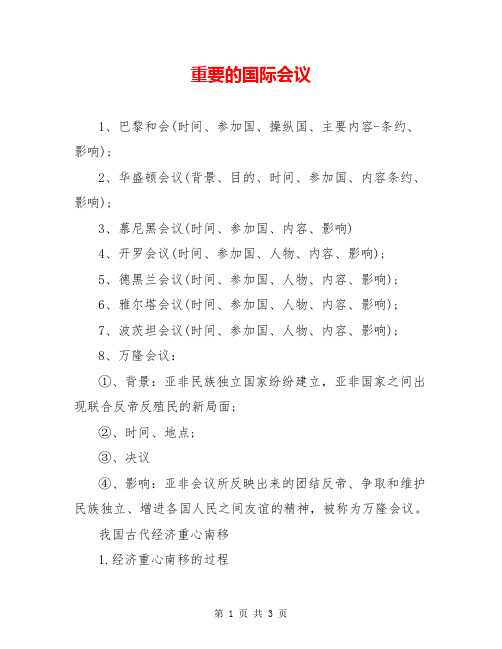
重要的国际会议1、巴黎和会(时间、参加国、操纵国、主要内容-条约、影响);2、华盛顿会议(背景、目的、时间、参加国、内容条约、影响);3、慕尼黑会议(时间、参加国、内容、影响)4、开罗会议(时间、参加国、人物、内容、影响);5、德黑兰会议(时间、参加国、人物、内容、影响);6、雅尔塔会议(时间、参加国、人物、内容、影响);7、波茨坦会议(时间、参加国、人物、内容、影响);8、万隆会议:①、背景:亚非民族独立国家纷纷建立,亚非国家之间出现联合反帝反殖民的新局面;②、时间、地点;③、决议④、影响:亚非会议所反映出来的团结反帝、争取和维护民族独立、增进各国人民之间友谊的精神,被称为万隆会议。
我国古代经济重心南移1.经济重心南移的过程我国古代经济重心由北向南这一地域性的转变,经历了一个发展过程:①商周时期经济重心在河南、陕西一带;②秦汉时期,经济重心在关中地区;③南北朝时期,长江中下游的经济发展较快,南北经济发展已趋向平衡;④唐代安史之乱后,经济重心开始南移;⑤南宋时,经济重心南移完成,江南已成为全国经济中心;⑥明清时期,江南地区不仅是农业经济中心,也是工商业中心,这里产生了资本主义生产关系萌芽。
2.经济重心南移的原因①南方自然条件优越;②南方相对安定,为经济发展提供了有利的社会环境;③北方战乱,北民南迁,不仅为南方提供了大量农业劳动力,并且带去先进的生产工具和技术;④统治阶级为保证国用,调整政策,重视发展生产;⑤政治中心南移(如南宋)对经济重心南移也有一定影响。
3.经济重心南移的特征⑴北方农民大量南迁,带去了先进的生产技术和经验,体现了当时生产力发展的最高水平。
⑵南移趋势往往在国家分裂或封建割据、战乱时期最突出。
⑶政治中心的南移对经济重心的南移有一定影响。
5、(1)、战争后中国的社会性质发生了根本性变化,由一个落后封闭但独立自主的封建国家沦为一个半殖民地半封建社会。
(2)、中国的发展方向发生变化,战前中国是一个没落的封建大国,封建制度已经腐朽,在缓慢地向资本主义社会发展,如果没有外来势力干扰,中国最终也会向西方大国那样发生资产阶级革命成为资本主义国家;而鸦片战争后中国的民族资本主义不可能获得正常发展,中国也就不可能发展为成熟的资本主义社会,而最终选择了社会主义道路。
2009年G20伦敦峰会公告全文
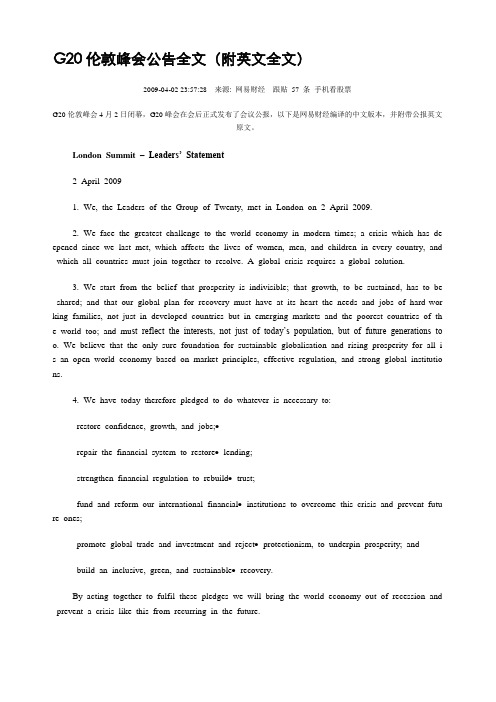
G20伦敦峰会公告全文(附英文全文)2009-04-02 23:57:28来源: 网易财经跟贴57 条手机看股票G20伦敦峰会4月2日闭幕,G20峰会在会后正式发布了会议公报,以下是网易财经编译的中文版本,并附带公报英文原文。
London Summit –Leaders’ Statement2 April 20091. We, the Leaders of the Group of Twenty, met in London on 2 April 2009.2. We face the greatest challenge to the world economy in modern times; a crisis which has de epened since we last met, which affects the lives of women, men, and children in every country, and which all countries must join together to resolve. A global crisis requires a global solution.3. We start from the belief that prosperity is indivisible; that growth, to be sustained, has to be shared; and that our global plan for recovery must have at its heart the needs and jobs of hard-wor king families, not just in developed countries but in emerging markets and the poorest countries of th e world too; and mu st reflect the interests, not just of today’s population, but of future generations to o. We believe that the only sure foundation for sustainable globalisation and rising prosperity for all i s an open world economy based on market principles, effective regulation, and strong global institutio ns.4. We have today therefore pledged to do whatever is necessary to:restore confidence, growth, and jobs;∙repair the financial system to restore∙lending;strengthen financial regulation to rebuild∙trust;fund and reform our international financial∙institutions to overcome this crisis and prevent futu re ones;promote global trade and investment and reject∙protectionism, to underpin prosperity; andbuild an inclusive, green, and sustainable∙recovery.By acting together to fulfil these pledges we will bring the world economy out of recession and prevent a crisis like this from recurring in the future.5. The agreements we have reached today, to treble resources available to the IMF to $750 billi on, to support a new SDR allocation of $250 billion, to support at least $100 billion of additional le nding by the MDBs, to ensure $250 billion of support for trade finance, and to use the additional res ources from agreed IMF gold sales for concessional finance for the poorest countries, constitute an ad ditional $1.1 trillion programme of support to restore credit, growth and jobs in the world economy. Together with the measures we have each taken nationally, this constitutes a global plan for recovery on an unprecedented scale.Restoring growth and jobs6. We are undertaking an unprecedented and concerted fiscal expansion, which will save or create millions of jobs which would otherwise have been destroyed, and that will, by the end of next yea r, amount to $5 trillion, raise output by 4 per cent, and accelerate the transition to a green economy. We are committed to deliver the scale of sustained fiscal effort necessary to restore growth.7. Our central banks have also taken exceptional action. Interest rates have been cut aggressively in most countries, and our central banks have pledged to maintain expansionary policies for as long as needed and to use the full range of monetary policy instruments, including unconventional instrume nts, consistent with price stability.8. Our actions to restore growth cannot be effective until we restore domestic lending and intern ational capital flows. We have provided significant and comprehensive support to our banking systems to provide liquidity, recapitalise financial institutions, and address decisively the problem of impaired assets. We are committed to take all necessary actions to restore the normal flow of credit through t he financial system and ensure the soundness of systemically important institutions, implementing our policies in line with the agreed G20 framework for restoring lending and repairing the financial secto r.9. Taken together, these actions will constitute the largest fiscal and monetary stimulus and the most comprehensive support programme for the financial sector in modern times. Acting together stre ngthens the impact and the exceptional policy actions announced so far must be implemented without delay. Today, we have further agreed over $1 trillion of additional resources for the world economy through our international financial institutions and trade finance.10. Last month the IMF estimated that world growth in real terms would resume and rise to ov er 2 percent by the end of 2010. We are confident that the actions we have agreed today, and our u nshakeable commitment to work together to restore growth and jobs, while preserving long-term fiscal sustainability, will accelerate the return to trend growth. We commit today to taking whatever action is necessary to secure that outcome, and we call on the IMF to assess regularly the actions taken a nd the global actions required.11. We are resolved to ensure long-term fiscal sustainability and price stability and will put in place credible exit strategies from the measures that need to be taken now to support the financial se ctor and restore global demand. We are convinced that by implementing our agreed policies we will l imit the longer-term costs toour economies, thereby reducing the scale of the fiscal consolidation necessary over the longer t erm.12. We will conduct all our economic policies cooperatively and responsibly with regard to the impact on other countries and will refrain from competitive devaluation of our currencies and promote a stable and well-functioning international monetary system. We will support, now and in the future, to candid, even-handed, and independent IMF surveillance of our economies and financial sectors, of the impact of our policies on others, and of risks facing the global economy.Strengthening financial supervision and regulation13. Major failures in the financial sector and in financial regulation and supervision were funda mental causes of the crisis. Confidence will not be restored until we rebuild trust in our financial sys tem. We will take action to build a stronger, more globally consistent, supervisory and regulatory fra mework for the future financial sector, which will support sustainable global growth and serve the ne eds of business and citizens.14. We each agree to ensure our domestic regulatory systems are strong. But we also agree to establish the much greater consistency and systematic cooperation between countries, and the framewor k of internationally agreed high standards, that a global financial system requires. Strengthened regulat ion and supervision must promote propriety, integrity and transparency; guard against risk across the f inancial system; dampen rather than amplify the financial and economic cycle; reduce reliance on inap propriately risky sources of financing; and discourage excessive risk-taking. Regulators and supervisors must protect consumers and investors, support market discipline, avoid adverse impacts on other cou ntries, reduce the scope for regulatory arbitrage, support competition and dynamism, and keep pace wi th innovation in the marketplace.15. To this end we are implementing the Action Plan agreed at our last meeting, as set out in t he attached progress report. We have today also issued a Declaration, Strengthening the Financial Syst em. In particular we agree:to establish a new Financial Stability Board (FSB)∙with a strengthened mandate, as a successo r to the Financial Stability Forum (FSF), including all G20 countries, FSF members, Spain, and the E uropean Commission;that the FSB should collaborate with the IMF to∙provide early warning of macroeconomic and financial risks and the actions needed to address them;to reshape our regulatory systems so that our∙authorities are able to identify and take account of macro-prudential risks;to extend regulation and oversight to all∙systemically important financial institutions, instrument s and markets. This will include, for the first time, systemically important hedge funds;to endorse and implement the FSF’s tough new∙principles on pay and compensation and to su pport sustainable compensation schemes and the corporate social responsibility of all firms;to take action, once recovery is assured, to∙improve the quality, quantity, and international con sistency of capital in the banking system. In future, regulation must prevent excessive leverage and re quire buffers of resources to be built up in good times;to take action against non-cooperative∙jurisdictions, including tax havens. We stand ready to d eploy sanctions to protect our public finances and financial systems. The era of banking secrecy is ov er. We note that the OECD has today published a list of countries assessed by the Global Forum ag ainst the international standard for exchange of tax information;to call on the accounting standard setters to work∙urgently with supervisors and regulators to i mprove standards on valuation and provisioning and achieve a single set of high-quality global accoun ting standards; andto extend regulatory oversight and registration to∙Credit Rating Agencies to ensure they meet t he international code of good practice, particularly to prevent unacceptable conflicts of interest.16. We instruct our Finance Ministers to complete the implementation of these decisions in line with the timetable set out in the Action Plan. We have asked the FSB and the IMF to monitor progr ess, working with the Financial Action Taskforce and other relevant bodies, and to provide a report t o the next meeting of our Finance Ministers in Scotland in November.Strengthening our global financial institutions17. Emerging markets and developing countries, which have been the engine of recent world gro wth, are also now facing challenges which are adding to the current downturn in the global economy. It is imperative for global confidence and economic recovery that capital continues to flow to them. This will require a substantial strengthening of the international financial institutions, particularly theIMF. We have therefore agreed today to make available an additional $850 billion of resources through the global financial institutions to support growth in emerging market and developing countrie s by helping to finance counter-cyclical spending, bank recapitalisation, infrastructure, trade finance, ba lance of payments support, debt rollover, and social support. To this end:we have agreed to increase the resources available∙to the IMF through immediate financing fr om members of $250 billion, subsequently incorporated into an expanded and more flexible New Arra ngements to Borrow, increased by up to $500 billion, and to consider market borrowing if necessary; andwe support a substantial increase in lending of at∙least $100 billion by the Multilateral Develo pment Banks (MDBs), including to low income countries, and ensure that all MDBs, including have t he appropriate capital.18. It is essential that these resources can be used effectively and flexibly to support growth. We welcome in this respect the progress made by the IMF with its new Flexible Credit Line (FCL) an d its reformed lending and conditionality framework which will enable the IMF to ensure that its faci lities address effectively the underlying causes of countries’ balance of payments financing needs, parti cularly the withdrawal of external capital flows to the banking and corporate sectors. We support Me xico’s decision to seek an FCL arrangement.19. We have agreed to support a general SDR allocation which will inject $250 billion into the world economy and increase global liquidity, and urgent ratification of the Fourth Amendment.20. In order for our financial institutions to help manage the crisis and prevent future crises we must strengthen their longer term relevance, effectiveness and legitimacy. So alongside the significant increase in resources agreed today we are determined to reform and modernise the international finan cial institutions to ensure they can assist members and shareholders effectively in the new challenges they face. We will reform their mandates, scope and governance to reflect changes in the world econ omy and the new challenges of globalisation, and that emerging and developing economies, including the poorest, must have greater voice and representation. This must be accompanied by action to incre ase the credibility and accountability of the institutions through better strategic oversight and decision making. To this end:we commit to implementing the package of IMF quota∙and voice reforms agreed in April 200 8 and call on the IMF to complete the next review of quotas by January 2011;we agree that, alongside this, consideration∙should be given to greater involvement of the Fun d’s Governors in providing strategic direction to the IMF and increasing its accountability;we commit to implementing the World Bank reforms∙agreed in October 2008. We look forwar d to further recommendations, at the next meetings, on voice and representation reforms on an acceler ated timescale, to be agreed by the 2010 Spring Meetings;we agree that the heads and senior leadership of∙the international financial institutions should be appointed through an open, transparent, and merit-based selection process; andbuilding on the current reviews of the IMF and∙World Bank we asked the Chairman, working with the G20 Finance Ministers, to consult widely in an inclusive process and report back to the ne xt meeting with proposals for further reforms to improve the responsiveness and adaptability of the IF Is.21. In addition to reforming our international financial institutions for the new challenges of glo balisation we agreed on the desirability of a new global consensus on the key values and principles t hat will promote sustainable economic activity. We support discussion on such a charter for sustainabl e economic activity with a view to further discussion at our next meeting. We take note of the work started in other fora in this regard and look forward to further discussion of this charter for sustaina ble economic activity.Resisting protectionism and promoting global trade and investment22. World trade growth has underpinned rising prosperity for half a century. But it is now falling for the first time in 25 years. Falling demand is exacerbated by growing protectionist pressures and a withdrawal of trade credit. Reinvigorating world trade and investment is essential for restoring glo bal growth. We will not repeat the historic mistakes of protectionism of previous eras. To this end:we reaffirm the commitment made in Washington: to∙refrain from raising new barriers to inve stment or to trade in goods and services, imposing new export restrictions, or implementing World Tr ade Organisation (WTO)inconsistent measures to stimulate exports. In addition we will rectify promptly any such measur es. We extend this pledge to the end of 2010;we will minimise any negative impact on trade and∙investment of our domestic policy actions including fiscal policy and action in support of the financial sector. We will not retreat into financia l protectionism, particularly measures that constrain worldwide capital flows, especially to developing countries;we will notify promptly the WTO of any such∙measures and we call on the WTO, together with other international bodies, within their respective mandates, to monitor and report publicly on ou r adherence to these undertakings on a quarterly basis;we will take, at the same time, whatever steps we∙can to promote and facilitate trade and inv estment; andwe will ensure availability of at least $250∙billion over the next two years to support trade fi nance through our export credit and investment agencies and through the MDBs. We also ask our reg ulators to make use of available flexibility in capital requirements for trade finance.23. We remain committed to reaching an ambitious and balanced conclusion to the Doha Develo pment Round, which is urgently needed. This could boost the global economy by at least $150 billio n per annum. To achieve this we are committed to building on the progress already made, including with regard to modalities.24. We will give renewed focus and political attention to this critical issue in the coming period and will use our continuing work and all international meetings that are relevant to drive progress.Ensuring a fair and sustainable recovery for all25. We are determined not only to restore growth but to lay the foundation for a fair and susta inable world economy. We recognise that the current crisis has a disproportionate impact on the vulne rable in the poorest countries and recognise our collective responsibility to mitigate the social impact of the crisis to minimise long-lasting damage to global potential. To this end:we reaffirm our historic commitment to meeting the∙Millennium Development Goals and to ac hieving our respective ODA pledges, including commitments on Aid for Trade, debt relief, and the G leneagles commitments, especially to sub-Saharan Africa;the actions and decisions we have taken today will∙provide $50 billion to support social prote ction, boost trade and safeguard development in low income countries, as part of the significant incre ase in crisis support for these and other developing countries and emerging markets;we are making available resources for social∙protection for the poorest countries, including thr ough investing in long-term food security and through voluntary bilateral contributions to the World B ank’s Vulnerability Framework, including the Inf rastructure Crisis Facility, and the Rapid Social Respo nse Fund;we have committed, consistent with the new income∙model, that additional resources from agr eed sales of IMF gold will be used, together with surplus income, to provide $6 billion additional co ncessional and flexible finance for the poorest countries over the next 2 to 3 years. We call on the I MF to come forward with concrete proposals at the Spring Meetings;we have agreed to review the flexibility of the∙Debt Sustainability Framework and call on the IMF and World Bank to report to the IMFC and Development Committee at the Annual Meetings; andwe call on the UN, working with other global∙institutions, to establish an effective mechanism to monitor the impact of the crisis on the poorest and most vulnerable.26. We recognise the human dimension to the crisis. We commit to support those affected by the crisis by creating employment opportunities and through income support measures. We will build a fair and family-friendly labour market for both women and men. We therefore welcome the reports ofthe London Jobs Conference and the Rome Social Summit and the key principles they proposed. We will support employment by stimulating growth, investing in education and training, and through acti ve labour market policies, focusing on the most vulnerable. We call upon the ILO, working with othe r relevant organisations, to assess the actions taken and those required for the future.27. We agreed to make the best possible use of investment funded by fiscal stimulus programm es towards the goal of building a resilient, sustainable, and green recovery. We will make the transiti on towards clean, innovative, resource efficient, low carbon technologies and infrastructure. We encour age the MDBs to contribute fully to the achievement of this objective. We will identify and work to gether on further measures to build sustainable economies.28. We reaffirm our commitment to address the threat of irreversible climate change, based on t he principle of common but differentiated responsibilities, and to reach agreement at the UN Climate Change conference in Copenhagen in December 2009.Delivering our commitments29. We have committed ourselves to work together with urgency and determination to translate t hese words into action. We agreed to meet again before the end of this year to review progress on o ur commitments. (本文来源:网易财经)G20伦敦峰会公告全文(附英文全文)2009-04-02 23:57:28来源: 网易财经跟贴57 条手机看股票G20伦敦峰会4月2日闭幕,G20峰会在会后正式发布了会议公报,以下是网易财经编译的中文版本,并附带公报英文原文。
2009年重要国际矿冶活动和会议
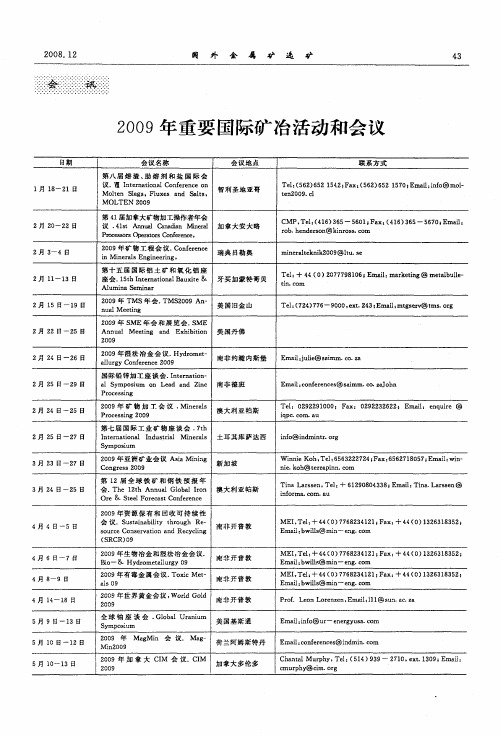
2月 2 4日
一
2 5日
20 0 9年 矿 物 加 工 会 议 . n rl Mieas P 澳 大 利 亚 帕 斯
r c sig 2 0 o e sn 0 9
Te:0 9 2 1 0 ; F x 0 9 2 2 2 ;E i e q i @ l 22900 a : 2 2 3 6 2 mal n ur : e
Al u n e nr mi a S mi a
T l+ 4 0 0 7 9 16 En i mak t g@ meab l - e: 4( )2 7 78 0 ; ral r ei : n tlul e
tn c m i. o
2月 1 5日
一
1 9日
20 0 9年 TMS年 会 . TMS 0 9 An 2 0 -
T i n a se , l + 6 2 0 0 3 8 E i Tia L r sn@ aL rs n Te: 1 9 8 4 3 ; mal n . a se : if ma c n . u n or . or a
4月 4 日
一
5日
20 0 9年 资 源 保 有 和 回收 可 持 续 性 会 议 .S sa a i t h o g — u ti bl y t r u h Re n i 南非 开 普敦 s u c o sr a i n e y l g o reC n ev t n a d R c ci o n
C MP. e:4 6 3 5 5 0 ; a : 4 6 3 5 5 7 ; mal T l(1 ) 6 — 6 1 F x ( 1 ) 6 — 6 0 E i :
r b h n e s n kn o s c r o . e d ro @ ir s . o n
西安交通大学高水平国际会议名录(2009年版)
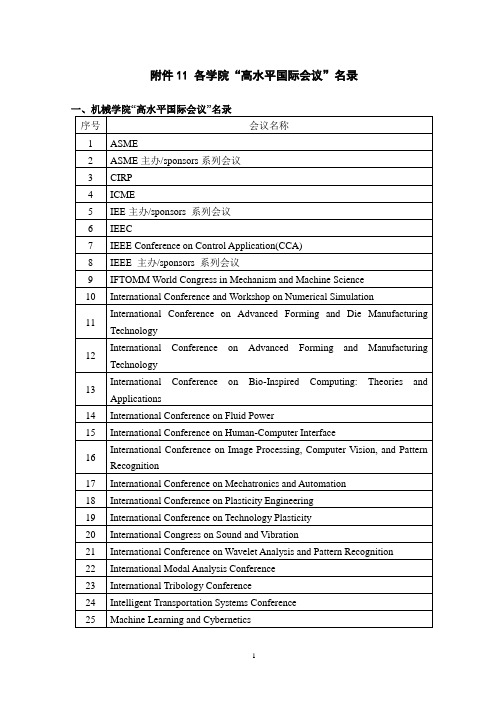
5International Conference on Mechanical Behaviour of Materials
6International Conference on Martensitic Transformations
7International Conference on Nanomaterials
8Inter Conference of Hydrogen Energy,国际氢能协会、美国氢能协会等
9International Institute of Welding (IIW),国际焊接学会
10International Thermal Spray Conference, Organized by ASM International, IIW (International Institute of Welding), DVS (German Welding Society), (美国材料学会,国际焊接学会与德国焊接学会联合组织)
21APS March Meeting(美国物理学会三月会议)
22International Symposium on Eco-materials Processing and Design(ISEPD)(环境材料制备与设计国际研讨会)
三、能动学院“高水平国际会议”名录
序号
会议名称
主办者
周期
1
Symposium of the Combustion Institute(国际燃烧会议)
18Powder Metallurgy World Congress
19International Conference on High Temperature Ceramic Matrix Composites
2010年中考政治时政必备(全国通用~~2009.9-2010.4)
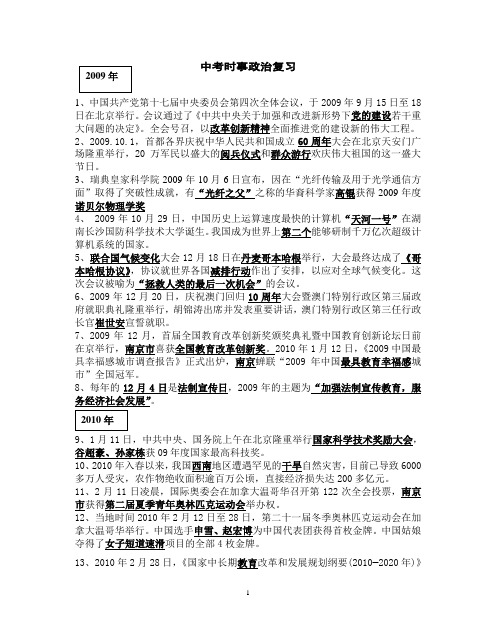
中考时事政治复习1、中国共产党第十七届中央委员会第四次全体会议,于2009年9月15日至18日在北京举行。
会议通过了《中共中央关于加强和改进新形势下党的建设若干重大问题的决定》。
全会号召,以改革创新精神全面推进党的建设新的伟大工程。
2、2009.10.1,首都各界庆祝中华人民共和国成立60周年大会在北京天安门广场隆重举行,20万军民以盛大的阅兵仪式和群众游行欢庆伟大祖国的这一盛大节日。
3、瑞典皇家科学院2009年10月6日宣布,因在“光纤传输及用于光学通信方面”取得了突破性成就,有“光纤之父”之称的华裔科学家高锟获得2009年度诺贝尔物理学奖4、 2009年10月29日,中国历史上运算速度最快的计算机“天河一号”在湖南长沙国防科学技术大学诞生。
我国成为世界上第二个能够研制千万亿次超级计算机系统的国家。
5、联合国气候变化大会12月18日在丹麦哥本哈根举行,大会最终达成了《哥本哈根协议》,协议就世界各国减排行动作出了安排,以应对全球气候变化。
这次会议被喻为“拯救人类的最后一次机会”的会议。
6、2009年12月20日,庆祝澳门回归10周年大会暨澳门特别行政区第三届政府就职典礼隆重举行,胡锦涛出席并发表重要讲话,澳门特别行政区第三任行政长官崔世安宣誓就职。
7、2009年12月,首届全国教育改革创新奖颁奖典礼暨中国教育创新论坛日前在京举行,南京市喜获全国教育改革创新奖。
2010年1月12日,《2009中国最具幸福感城市调查报告》正式出炉,南京蝉联“2009年中国最具教育幸福感城市”全国冠军。
8、每年的12月4日是法制宣传日,2009年的主题为“加强法制宣传教育,服务经济社会发展”。
9、1月11日,中共中央、国务院上午在北京隆重举行国家科学技术奖励大会,谷超豪、孙家栋获09年度国家最高科技奖。
10、2010年入春以来,我国西南地区遭遇罕见的干旱自然灾害,目前已导致6000多万人受灾,农作物绝收面积逾百万公顷,直接经济损失达200多亿元。
2009第12期 (大事备忘)

大事备忘(11月15日—12月15日)(一)国际◎11月15日,亚太经合组织(APEC)第十七次领导人非正式会议于新加坡闭幕。
会后发表的《促进持续增长,密切区域联系——亚太经合组织第十七次领导人非正式会议宣言》(简称“新加坡宣言”)称,要通过自由开放的贸易与投资,支持亚太地区经济增长与繁荣。
◎11月16日,世界粮食安全首脑会议在意大利首都罗马拉开帷幕。
此次会议旨在寻求帮助全球10亿多人摆脱饥饿的有效途径。
发起此次会议的联合国粮农组织总干事雅克·迪乌夫会前呼吁各国增加农业投入,特别是加大对穷国小型农户的扶持力度。
他敦促发达国家提高对发展中国家的农业发展援助水平,以帮助穷国解决粮食危机。
◎11月19日,韩国总统李明博与到访的美国总统奥巴马举行会谈,再次确认美国将向韩国提供核保护伞和“延伸威慑”,并将履行《韩美同盟未来展望》中的承诺,进一步发展“21世纪战略同盟关系”。
两国元首再次确认应通过六方会谈实现朝鲜“完全的、可验证的弃核”。
为使朝鲜早日重返六方会谈,韩美双方将与六方会谈其他与会国保持紧密合作。
◎11月28日,三菱重工业公司与日本宇宙航空研究开发机构上午在鹿儿岛种子岛宇宙中心发射了搭载情报收集卫星“光学3号”的H2A火箭。
卫星脱离火箭后进入预定轨道,发射取得成功。
◎12月1日,日本银行(央行)召开临时货币政策会议,决定采用新的货币供应方式,按照与当前政策利率相同的0.1%的年利率,向金融机构提供为期三个月的资金。
此次投放金额为10万亿日元(约合7904亿元人民币),旨在促使中长期利率下降,支撑经济发展。
(二)国内◎11月16日,中国文字博物馆开馆仪式在河南安阳举行。
江泽民同志为博物馆题写馆名,这是我国第一座以文字为主题的博物馆,共入藏文物4123件,其中一级文物305件,涉及甲骨文、金文、简牍和帛书、汉字发展史、汉字书法史、少数民族文字、世界文字等多个方面。
◎11月17日,国家主席胡锦涛在人民大会堂同来华进行国事访问的美国总统奥巴马举行会谈。
时政要闻(2009年9月)

时政要闻(2009年9月)作者:姬瀚达来源:《中学政史地·高中文综》2009年第11期国内要闻★9月1日,我国自主设计制造的大飞机C919项目正式开工制造机头工程样机,这标志着大飞机研制取得实质性进展。
★9月3日,北京科兴生物制品有限公司生产的甲型H1N1流感病毒裂解疫苗“盼尔来福.1”获得由国家食品药品监管局颁发的药品批准文号,这也是全球首支获得生产批号的甲型H1N1流感疫苗。
★9月4日消息,国务院日前出台了新型农村社会养老保险试点的指导意见,按照加快建立覆盖城乡居民的社会保障体系的要求,逐步解决农村居民老有所养问题。
★9月4日,我国有史以来最大规模海上搜救演习2009年国家海上搜救桌面演习暨东海搜救演习成功举行。
此次多部委参与,海陆空并举,北京、杭州、宁波三地同步进行的演习,共投入救助船舶26艘、飞机3架,参演人员千余人,在参演力量、演习科目、指挥层次和技术保障等方面创我国海上演习之最。
★9月5日,国家航空工业重大项目——大型灭火,水上救援水陆两栖飞机研制项目在湖北省荆门市正式启动。
该项目将填补我国大型水陆两栖飞机的研制空白,形成拥有自主知识产权的设计研发体系,全面提升我国水面飞行器的设计制造能力和产业化能力。
★新华社9月5日报道,经中央同意,新疆维吾尔自治区党委决定,免去栗智同志乌鲁木齐市委书记职务,朱海仑同志任乌鲁木齐市委书记。
同时,对自治区公安厅主要负责人也作了调整。
★9月7日,国务院总理温家宝主持召开国务院常务会议,研究部署做好秋冬季甲型H1N1流感防控工作。
会议还审议并原则通过了《农业机械安全监督管理条例(草案)》和《放射性物品运输安全管理条例(草案)》,决定这两个草案经进一步修改后,由国务院公布施行。
★国家统计局9月11日公布数据显示,8月份居民消费价格(CN)同比下降1.2%,工业品出厂价格(PPI)同比下降7.9%,这是我国物价指数连续第七个月双双负增长,但是降幅有所收窄。
国际(2009年3月-

4月1日,阿尔巴尼亚和克罗地亚正式加入北约,从而使 该组织成员国总数升至28个. 该组织成员国总数升至28个. 4月2日,二十国集团伦敦金融峰会在英国举行.二十 国集团领导人同意为IMF和世界银行等多边金融机构提供 国集团领导人同意为IMF和世界银行等多边金融机构提供 总额1 总额1万亿美元资金,其中国际货币基金组织资金规模将 扩大至现在的3倍,由2500亿美元增加到7500亿美元, 扩大至现在的3倍,由2500亿美元增加到7500亿美元, 以帮助陷入困境的国家.在加强金融监管方面,二十国集 团领导人认为有必要对所有具有系统性影响的金融机构, 金融产品和金融市场实施监管和监督,并首次把对冲基金 置于金融监管之下.二十国集团领导人同意,由国际货币 基金组织增发2500亿美元特别提款权分配给各成员,以 基金组织增发2500亿美元特别提款权分配给各成员,以 增强流动性.国际货币基金组织将出售黄金储备,以帮助 贫穷国家.各国政府将严厉取缔"避税港" 贫穷国家.各国政府将严厉取缔"避税港".
7月27日~28日,首轮中美战略与经济对话在华盛顿举行. 27日~28日,首轮中美战略与经济对话在华盛顿举行. 8月4日,美国前总统克林顿对朝鲜进行了访问. 8月15日,在泰国首都曼谷举行的第八次中国-东盟经贸部长会议 15日,在泰国首都曼谷举行的第八次中国-东盟经贸部长会议 上,中国与东盟10国签署了中国-东盟自由贸易区《投资协议》 上,中国与东盟10国签署了中国-东盟自由贸易区《投资协议》. 8月18日,格鲁吉亚外交部发表声明,宣布格鲁吉亚正式退出独联 18日,格鲁吉亚外交部发表声明,宣布格鲁吉亚正式退出独联 体. 8月30日,日本举行第45届众议院选举,最大在野党民主党获胜. 30日,日本举行第45届众议院选举,最大在野党民主党获胜. 8月31日~9月4日,第三次世界气候大会在日内瓦举行.会议主 31日~9 题为"气候预测和信息为决策服务" 题为"气候预测和信息为决策服务",由科学会议和高级别会议两部 分组成. 9月5日,二十国集团财长和央行行长会议在伦敦举行. 9月11日,日本首个太空货运飞船——空间站转运飞行器1号 11日,日本首个太空货运飞船——空间站转运飞行器1 (HTV1)升空. HTV1)升空.
- 1、下载文档前请自行甄别文档内容的完整性,平台不提供额外的编辑、内容补充、找答案等附加服务。
- 2、"仅部分预览"的文档,不可在线预览部分如存在完整性等问题,可反馈申请退款(可完整预览的文档不适用该条件!)。
- 3、如文档侵犯您的权益,请联系客服反馈,我们会尽快为您处理(人工客服工作时间:9:00-18:30)。
清华大学各院系(学科)
重要国际学术会议目录
研究生院汇编
二○○九年九月
目录
1. 建筑学院 (1)
2. 土木工程系 (4)
3. 建设管理系 (8)
4. 水利水电工程系 (10)
5. 环境科学与工程系 (12)
6. 机械工程系 (15)
7. 精密仪器系(一级学科顶尖级国际会议) (17)
7. 精密仪器系(机械工程) (18)
8. 精密仪器系(仪器科学与技术) (20)
9. 精密仪器系(光学工程) (22)
10. 热能工程系 (23)
11. 汽车工程系 (26)
12. 工业工程系 (28)
13. 电机系 (30)
14. 电子工程系(电子科学与技术) (33)
15. 电子工程系(信息与通信工程) (36)
16. 计算机科学与技术系 (39)
17. 自动化系 (42)
18. 航天航空学院(工程热物理) (45)
19. 航天航空学院(力学) (46)
20. 工物系、核研院 (48)
21. 化学工程系 (52)
22. 材料科学与工程 (55)
23. 数学系 (57)
24. 物理系 (59)
25. 化学系 (62)
26. 生物系 (64)
27. 经济管理学院(管理科学与工程) (67)
28. 经济管理学院(工商管理、数量经济学) (68)
29. 公共管理学院(公共管理) (70)
30. 公共管理学院(管理科学与工程) (73)
31. 人文学院 (74)
32. 人文学院(外语系) (75)
33. 法学院 (76)
34. 新闻与传播学院 (78)
35. 微纳电子学系 (80)
36. 医学院 (82)
建筑学院重要国际学术会议一、顶级会议(代表本学科领域最高水平的国际会议)
二、A类会议(本学科高水平国际会议)
三、B类会议(学术水平较高、按一定时间间隔规范化、系列性召开的国际会议。
)
土木水利学院土木工程系重要国际学术会议一、A类会议
三、B类会议
土木水利学院建设管理系重要国际学术会议一、顶尖级会议
二、A类会议
三、B类会议
土木水利学院水利水电工程系重要国际学术会议一、A类会议
二、B类会议
环境科学与工程系重要国际学术会议一、A类会议
二、B类会议
机械工程系重要国际学术会议一、A类会议
二、B类会议
精仪系一级学科顶尖级国际学术会议一、顶尖级国际会议
精仪系机械工程学科重要国际学术会议一、A类会议
二、B类会议
精仪系仪器科学与技术学科重要国际学术会议一、A类会议
二、B类会议
精仪系光学工程学科重要国际学术会议一、A类会议
二、B类会议
热能工程系重要国际学术会议一、A类会议
二、B类会议
汽车工程系重要国际学术会议一、A类会议
二、B类会议
工业工程系重要国际学术会议一、A类会议
二、B类会议
2009 年06 月23日
电机系重要国际学术会议
电子系(电子科学与技术)重要国际学术会议目录(2009年6月26日)一、顶级会议
二、A类会议(序号不表示优先顺序)
三、B类会议(序号不表示优先顺序)
电子工程系(信息与通信工程)重要国际学术会议目录(2009年6月26日)一、顶级会议
二、A类会议(序号不表示优先顺序)
三、B类会议(序号不表示优先顺序)
计算机科学与技术系重要国际学术会议一、A类会议
二、B类会议
自动化系重要国际学术会议一、顶级会议
航天航空学院(工程热物理)重要国际学术会议一、A类会议
二、B类会议
航天航空学院(力学)重要国际学术会议一、A类会议
二、B类会议。
